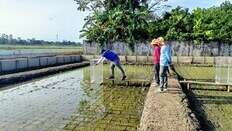- BASF's Global Carbon Field Trial Program began in 2024 in the Philippines.
- The program aims to cut CO2e emissions of five key crops by 30% by 2030.
- Alternate wetting and drying, direct seeded rice, and improved straw management are key interventions.
- AgBalance\u00ae Life Cycle Assessment model helps farmers track emissions and access carbon markets.

Introduction
BASF, in collaboration with the International Rice Research Institute (IRRI), has conducted Global Carbon Field Trials in the Philippines to explore climate-smart rice production methods. These trials aim to address the dual challenge of reducing greenhouse gas emissions and maintaining rice yields.
Key Findings
The trials demonstrated that a 30% reduction in greenhouse gas intensity in rice cultivation is achievable without compromising yield. Key interventions include alternate wetting and drying, direct seeded rice, and improved straw management, which significantly reduce emissions and freshwater use.
AgBalance® Model
BASF's AgBalance® Life Cycle Assessment model has proven effective in estimating on-farm emissions. This tool addresses a critical challenge for farmers, who often lack reliable means to track emissions from food production. By providing accurate emissions data, the model enables farmers to participate in carbon markets, potentially adding value to their operations.
Collaboration and Future Goals
The Global Carbon Field Trials are part of BASF's broader commitment to reduce CO2e emissions of five key crops by 30% by 2030. The initiative involves collaboration across BASF's R&D units, operations, and commercial teams, as well as partnerships with farmers, research institutes, and supply chain partners. The goal is to implement climate-smart agricultural practices and generate verified climate impacts at scale.

